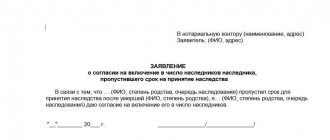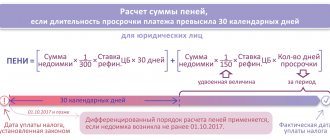Many lawyers remember by heart those deadlines that they “use” every day, but “unused” deadlines are often forgotten. You can’t remember everything, so many people have their own cheat sheets, “notes in the margins” both regarding deadlines and other legal nuances. I created cheat sheets for myself on terms in three parts (civil, criminal and administrative law) and thought that perhaps some of Pravorub’s users might also find them useful. And in the “” section there are often questions related to the deadlines for appealing, sending copies, the start and end of the period, the entry into force of the decision, the ruling and other similar issues.
So, a term in law is a moment or period of time, the onset or expiration of which entails the emergence, change or termination of rights, obligations, or the possibility of their implementation.
Procedural deadline: restoration cannot be missed
Possibility to restore a missed deadline
In both civil and arbitration proceedings, parties and third parties have the right to restore the missed deadline - for example, the deadline for filing an appeal (Article 112 of the Code of Civil Procedure, Article 117 of the Arbitration Procedure Code). At the same time, the Civil Procedure Code, unlike the Arbitration Procedure Code, does not directly establish a time limit within which it is possible to restore the missed procedural deadline. Because of this, situations occur when courts restore deadlines after, for example, seven years after the decision was made (No. A53-25028/2010; No. A53-25030/2010). Dentons Partner, K. Yu. n. Roman Zaitsev said that because of this, there is a position among foreign scientists that Russian judicial acts never finally enter into legal force and do not acquire the properties of irrefutability, and this does not correspond to the principle of legal certainty and international standards of justice.
The opinions of Russian practitioners on this matter differ. “The absence of a single pretrial period really harms legal certainty and stability of judicial acts. The unlimited period of possible restoration of a missed deadline makes it necessary to take into account the risk of cancellation of decisions that have already entered into force. Establishing a deadline within which it is possible to restore the term will have a positive impact on the stability of court decisions,” Ilnar Abdulov, a lawyer at the Moscow firm Kovalev, Tugushi and Partners, agrees with his foreign colleagues. “If any legislative changes are needed, they may consist of establishing a maximum period for filing a complaint along with a petition to restore the missed period, which will be similar to the institution of a 10-year objective limitation period under the Civil Code,” the managing partner of the Law Firm is sure. Tilling Peters" Oksana Peters. “In my opinion, the current rule is an example of an ideal balance between regulatory regulation and judicial discretion. It is important to note that one of the tasks of the arbitration process, as well as the civil process, is to ensure accessibility to justice. An excess of procedural restrictions would hinder the implementation of this goal and turn judges into administrative servants,” says Magomed Gazdiev, partner of the Olevinsky, Buyukyan and Partners PB.
Procedure for restoring a missed deadline
The procedure for restoring a missed procedural period is specified in the law (Article 112 of the Code of Civil Procedure, Article 117 of the Arbitration Procedure Code). In the arbitration process, a petition to restore such a period is submitted to the arbitration court in which the procedural action must be performed. Simultaneously with the filing of the petition, the procedural actions themselves are carried out (an application is submitted, a complaint is submitted, documents are submitted, etc.), in respect of which the deadline has been missed. The court then has five days to consider the petition. The parties are not notified or heard. Co-chairman of the “Regionservice” board, lawyer, Ph.D. n. Sergei Uchitel considers this procedure incorrect - because when making a decision to restore the term, the parties cannot present their evidence for and against restoration. It is possible to appeal a ruling to restore the procedural time limit only simultaneously with an appeal of the judicial act on the merits.
In civil proceedings, an application for the restoration of a missed procedural period is also submitted to the court in which the procedural action should have been performed simultaneously with the commission of such an action. However, it is considered in a court hearing and with notification of interested parties. The determination to restore or refuse to restore the term can be appealed. “In the Civil Procedure Code, the issue of protecting a court decision that has entered into legal force is resolved with the full understanding that the restoration of the procedural deadline is not just a formality, but a serious procedural act,” Uchitel believes.
Grounds for reinstating the missed deadline
Neither the Civil Procedure Code nor the Arbitration Procedure Code contains a closed list of grounds on which the court reinstates a missed deadline; the main thing is that the judge recognizes the reasons for missing a deadline as valid. Zaitsev is confident that Russian courts sometimes follow the approach that it is better to restore a missed deadline, even if there are doubts about the valid reasons for missing it, rather than deprive a participant in the process of the right to appeal. Therefore, judicial practice on the issue of restoring deadlines for appeal is not always uniform. Nevertheless, it is possible to identify the reasons on which courts most often restore procedural deadlines, and those on which the missed deadline, as a rule, cannot be restored.
Co-chairman of the “Regionservice” board, lawyer, Ph.D. n. Sergei Uchitel spoke about such a case in his practice: “Having won the dispute in the first instance, our client decided to “strengthen the precedent” - that is, to make the decision formally go through appeal and cassation. Having missed the deadline for an appeal by more than two weeks, the client filed a petition for its reinstatement and the appeal itself. He indicated the reasons for reinstating the term, which were recognized by the Plenum of the Supreme Arbitration Court No. 99 as clearly disrespectful, for example, a staff lawyer riding a snowmobile in the mountains of Khakassia and the lack of train tickets. Imagine our surprise when the court restored the deadline for appeal! The client had to be very nervous when considering the appeal on the merits.”
The grounds on which a missed deadline is usually restored:
untimely publication of judicial acts on the Internet (No. A40-161288/2013; No. A27-14549/2013; see “VS: Late publication of a judicial act in the Ring Road allows you to restore the period for appeal”). “The court must compare the length of delay in publishing the judicial act on the part of the court and the length of delay in filing a complaint on the part of the applicant. If the applicant missed less time than the court, then the deadline for filing a complaint should be restored,” says Saveliev, Batanov & Partners lawyer Maxim Belozerov. “However, if the applicant has committed a delay longer than the court delay, then the restoration of the missed period will depend on whether the applicant had a sufficient period of time to prepare and file the complaint,” added Olga Zelenskaya, lawyer at Andrey Gorodissky and Partners;
violation of the procedure for notifying the time and place of the trial (No. A40-73536/16; No. A65-12061/2015), including due to an error in publishing information about the judicial act. “I know of an example where the court, posting information about a dispute in the kad.arbitr system and notifying the defendant about the process, made a mistake in one letter of the company’s name. Accordingly, the defendant by title could not know about the existence of a dispute against him. Mail notices were also returned to court due to the absence of a company with the specified name at the designated address. Subsequently, these circumstances became the basis for canceling the decision and reinstating the deadline for appeal,” Belozerov said;
erroneous determination by the court of the period for appeal (No. A03-5785/2013; No. A64-2315/2014; No. A68-5832/2015) - for example, if the court ruling states that it can be appealed no later than 14 days from the date of issuance (instead 10 days established by law);
late production of a court decision (for details, read the material “The trial is not carried out soon, or What to do if the court violates procedural deadlines”);
illness or helpless state of the applicant (mental or emotional instability caused by severe stress, being under hypnosis, using narcotic medications as prescribed by the attending physician);
family circumstances of the applicant (illness or death of loved ones, change of place of residence due to study, illness, need to care for a seriously ill person);
natural disasters (floods, fires, earthquakes);
the applicant’s illiteracy (we are talking about the inability to write and read, and not about the lack of legal education);
sending the initial appeal directly to the appellate court, bypassing the court of first instance. “I know such a case. When the appellate court returned the complaint to the applicant, but the deadline for appeal had already passed. However, when filing an appeal, the applicant again referred to these circumstances, as well as the complexity of the dispute and the significant volume of case materials, which influenced the time frame for preparing the appeal. As a result, the term was restored,” Abdulov said.
The reasons why the missed deadline most likely cannot be restored:
the person is on a business trip or vacation;
absence of a lawyer on the organization's staff;
personnel changes and other internal organizational problems of a legal entity;
heavy workload for the lawyer (No. A56-29334/2009). “The heavy workload and professional errors of lawyers are not a worthy argument, since they cannot be an advantage over other participants in the process, but rather, on the contrary,” says co-chairman of the Regionservice board, lawyer Andrei Pereladov;
failure to notify the applicant due to the expiration of the letter’s retention period. “If the judicial act sent to the applicant was returned due to the expiration of the storage period, the applicant will be considered duly notified, and the reason for restoring the period will be disrespectful,” explained lawyer of Yukov and Partners, Ekaterina Baglaeva;
violation of jurisdiction. “The practice of courts of general jurisdiction is usually based on the need to guarantee the right to judicial protection and equal access of all persons to justice over other factors. Meanwhile, the presence of a professional judicial representative in an arbitration court who made a mistake with jurisdiction is, in some cases, assessed negatively by courts of general jurisdiction when considering an application for the restoration of a missed procedural period,” Zelenskaya said;
the petition does not indicate the reasons for missing the procedural deadline (No. A75-931/2012; No. A73-9720/2010);
the applicant has not completed the necessary procedural actions for which the procedural deadline has been missed;
The maximum permissible periods for restoration established by Art. have expired. 259, 276, 291.2, 308.1 and 312 of the APC - for arbitration cases (No. A40-34360/12-29-310).
***
If you nevertheless missed the procedural deadline and intend to reinstate it, do not delay going to court until the last minute. Please note that when considering a petition to restore the missed procedural period, the court will examine how wisely and conscientiously you used the right granted by law.
- Alina Mikhailova
- Arbitration process
- Civil process
What is the statute of limitations?
Many people confuse the statute of limitations and the statute of limitations, but these are two different concepts.
The limitation period is a time period provided to protect the rights and interests of citizens and organizations, while the procedural period is a period of time for performing specific actions.
The statute of limitations is three years, starting from the date when the citizen became aware of the violation of rights (Article 200 of the Civil Code of the Russian Federation). The maximum statute of limitations cannot exceed 10 years, with the exception of cases when it comes to terrorist acts (Article 96 of the Civil Code of the Russian Federation).
Cost of a claim in civil proceedings
Preliminary court hearing in civil proceedings
Lawyer's answers to questions about procedural deadlines in civil proceedings
What deadline do the courts set for providing additional evidence?
The period is determined by the judge individually, within reasonable limits and taking into account the provisions on the duration of consideration of civil cases.
I want to restore the statute of limitations. What should I do?
To do this, you need to collect evidence of valid reasons for missing your absence and draw up a statement of claim. The request for reinstatement can be reflected in it; it is not necessary to submit it separately. If satisfied, the judge will issue a ruling to accept the claim for proceedings.
The last day of the procedural period falls on a weekend. Will it carry over?
Yes. According to Art. 108 of the Code of Civil Procedure of the Russian Federation, if the stated period ends on a weekend or holiday, the end is postponed to the next working day following it.
The case was first considered by one court, then, due to a change of registration address by the defendant, it was transferred to another. When should this be completed?
The transfer is carried out within 15 days - the period for appealing the determination of transfer according to jurisdiction (Article 33 of the Code of Civil Procedure of the Russian Federation).
The court accepted the operative part; the reasons will be drawn up later. When does the appeal period begin?
The calculation of the PS in this case begins from the date of the decision in its final form (Article 321 of the Code of Civil Procedure of the Russian Federation).





